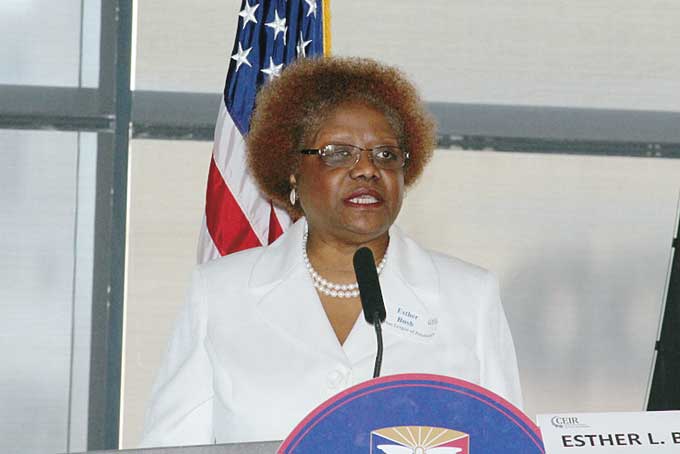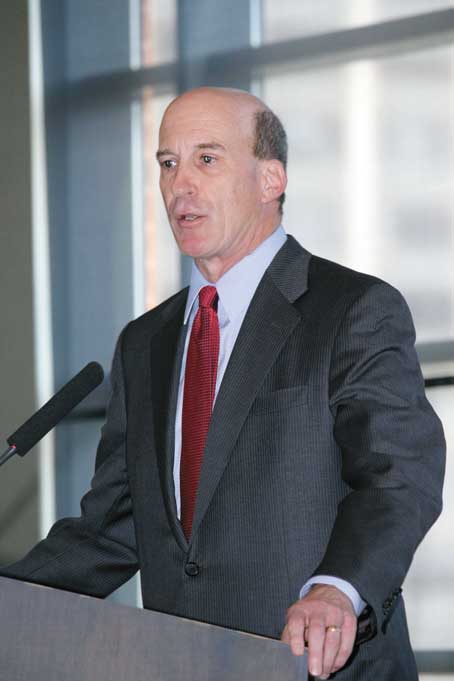
Montia Brock, a Chatham University graduate student in infant mental health counseling told the audience at the third annual Corporate Equity and Inclusion Roundtable that she faces a choice when she receives her degree—whether to stay in Pittsburgh or leave.
“I grew up in the Hill, graduated from Schenley,” she said. “I see a lot of changes in the Hill, but I am not part of it. So my question is do I stay, or do I go someplace where I’ll be welcomed and valued.”
The roundtable’s panelists agreed that Brock is exactly the kind of person—young, Black and well educated—that corporations, foundations and government agencies in Pittsburgh need to find, cultivate, hire and promote to address the city’s lack of diversity.
The half-day roundtable, hosted by Duquesne University, featured two panel discussions and two keynote speeches as well as addresses from Allegheny County Executive Rich Fitzgerald, Pittsburgh Mayor Bill Peduto and Dennis Yablonsky, CEO of the Allegheny Conference on Community Development.
Yablonsky presented data promoting the need to not only train and cultivate young African Americans, but to import racially diverse talent to address the more than 100,000 jobs that will open as the last of the baby boomers retire over the next 20 years.
“Diversity is not just a moral imperative, it’s an economic one,” he said. “We need to replace about 5,000 people a year just to stay even.”
He said his organization is working on several levels to address the problem, but like several of the other speakers, he noted it comes down to making a personal commitment.
“I made the decision to double the percent of minorities on our staff—now it’s not a big staff,” he said. “But last year it was 10 percent, today it’s 13 percent. And before our next funding cycle begins it will be 20 percent.”
The first half of the roundtable focused on diversification of corporate and institutional supplier chains and featured an address by Marquis Miller, vice president of the National Minority Supplier Diversity Council, and a panel discussion moderated by Doris Carson Williams, president and CEO of the African American Chamber of Commerce of western Pennsylvania.

Miller noted that 21 percent of the firms in the country are minority-owned. They do $1 billion a day in business and generate $49 billion in tax revenue each year. Increasing diversity by supporting them as suppliers of goods and professional services has multiple benefits.
“They will hire more minorities, benefiting Black communities. They are self-reinforcing,” he said. “They can also, because they have already established relations, support international growth.”
Miller also noted that as a “next practice,” companies should hire individuals with not only the job they are applying for in mind, but for the job above that.
“And you should hire them for their willingness and ability to be re-skilled for needs you have not yet identified,” he said.
A second panel, moderated by Urban League of Pittsburgh President and CEO Esther Bush looked at hiring, promoting and retaining minorities. Local firms like PNC, Highmark and UPMC have all instituted programs to do just that. But all agreed that hiring success is—especially in these days of faceless internet job applications—is tied to UPMC Chief Diversity Officer Candi Castleberry-Singleton’s admonition from last year’s conference: “if we only recommend people we know for jobs, we all need to make new friends.”
“But it goes beyond that, beyond ‘the illusion of inclusion,’” said Castleberry-Singleton. “It’s the difference between mentorship and sponsorship—that means you have skin in the game. It takes a conscious personal commitment from everyone.
And Sara Oliver-Carter, vice president for Diversity Council at Highmark, acknowledged man in the audience, Jacobi Kent, who’d taken advantage of her company’s programming. He’d driven from Camp Hill, Pa., to attend the conference.
“When I came to Highmark, I had just a BA, now I have an MBA and I’m a manager in accounts receivable,” he said. “A year ago, I wasn’t invited to things like this, So, I am making new friends, like Sara—she answers my calls.”
In closing, roundtable founder and Black Political Empowerment Project President Tim Stevens thanked everyone for their time, input and dedication.
“Our goal is that Pittsburgh will be emulated and duplicated in the level of equity and inclusion we create,” he said.
(Send comments to cmorrow@newpittsburghcourier.com.)
Follow @NewPghCourier on Twitter https://twitter.com/NewPghCourier
Like us at https://www.facebook.com/pages/New-Pittsburgh-Courier/143866755628836?ref=hl
Download our mobile app at https://www.appshopper.com/news/new-pittsburgh-courier